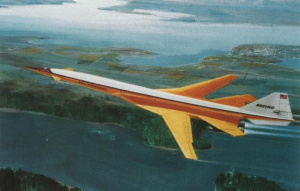Glycine Airman SST: Difference between revisions
Created page with "==Glycine Airman SST== ==Links== *Glycine *Switzerland *Main Page *History of Watches *Military Watches *Pilot Watches" |
|||
| Line 1: | Line 1: | ||
==Glycine Airman SST== | ==Glycine Airman SST== | ||
[[File:Boeing 2707.jpg|thumb]] | |||
SST stood for SuperSonic Transport and this model was released during an age where the world believed that supersonic passenger jets were the future. During the early 1960s, President John F. Kennedy instructed the Federal Aviation Authority to prepare a report on "national aviation goals for the periods between now and 1970". Whilst Kennedy did not live to see it, one of those goals was to compete with supersonic aviation projects of other countries, namely the British and French Concorde and the Ruissian Tupolev TU-144. | |||
Boeing won the lucrative contract to develop the first American supersonic commercial jet and began tests in the mid 1960s. Boeing planned for their plane, named the 2707 SST, to fly at Mach 2.7 (0.7 faster than Concorde) for a distance of up to 4200 miles with a capacity for 250 to 300 passengers. The 2707 was intended to have a 'swing wing' system which would allow the wings to change position from straight out during take-off and landing to a delta wing position as the speed increased. | |||
==Links== | ==Links== | ||
Revision as of 01:26, 17 April 2020
Glycine Airman SST

SST stood for SuperSonic Transport and this model was released during an age where the world believed that supersonic passenger jets were the future. During the early 1960s, President John F. Kennedy instructed the Federal Aviation Authority to prepare a report on "national aviation goals for the periods between now and 1970". Whilst Kennedy did not live to see it, one of those goals was to compete with supersonic aviation projects of other countries, namely the British and French Concorde and the Ruissian Tupolev TU-144.
Boeing won the lucrative contract to develop the first American supersonic commercial jet and began tests in the mid 1960s. Boeing planned for their plane, named the 2707 SST, to fly at Mach 2.7 (0.7 faster than Concorde) for a distance of up to 4200 miles with a capacity for 250 to 300 passengers. The 2707 was intended to have a 'swing wing' system which would allow the wings to change position from straight out during take-off and landing to a delta wing position as the speed increased.
